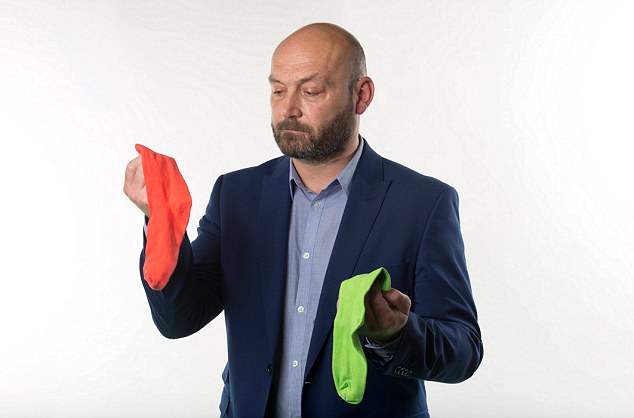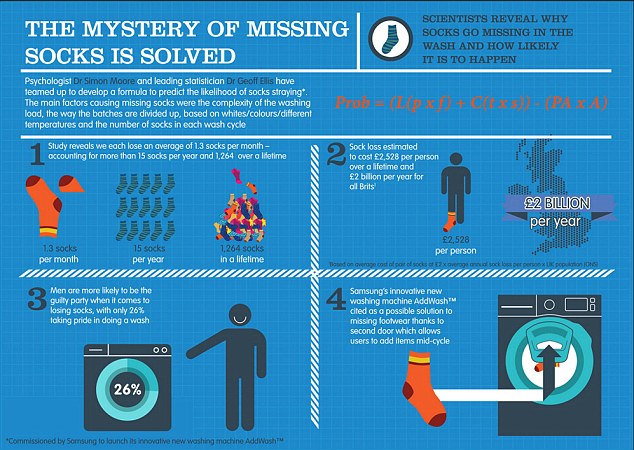Scientists explain the loss of the second sock in terms of the mathematics and psychology of the owner
Checkmate, missing socks

One of the team members at work
The other day, a team of scientists presented their own version of an explanation for the loss of a second sock - all owners of socks probably faced this problem. It doesn't matter if you have one pair of socks or a hundred pairs - the second socks of the pair sooner or later disappear. Manufacturers of socks are also familiar with this problem, so some of them produce socks with a radio tag and their own application for a mobile phone, there is also a simpler option with a button-down fastener that attaches one sock to another.
')
But this is the solution to the problem, not its explanation. Stephen Hawking somehow offered his own version of the explanation, according to which the second sock is drawn into a black hole (this, of course, is a joke). There are only two people in the project team: a statistician and a psychologist. Scientists, trying to find a solution to the paradox of the second sock, first conducted a survey of about two thousand people (the topic of the survey is the specifics of washing clothes and everyday habits), and then derived the "index of loss of socks."
As it turned out, the frequency of loss of socks is very much dependent on the type and amount of laundry loaded into the washing machine. The index looks like this: (L (pxf) + C (txs)) - (P x A) .
Here L is the volume of laundry to be washed, which depends on:
p is the number of family members;
f - frequency of washings (per week);
C - complexity of washing, depends on:
t is the number of types of washable clothes;
s - the number of washable socks (per week);
P - love of washing, depends on L and C. The coefficient of love of washing can be any number from 1 to 5. 1 - “I hate to wash”, 5 - “I love washing”.
A - thorough preparation for washing (checking pockets, etc.).

In addition to washing, socks tend to disappear during drying, carrying clothes, etc.
The work itself, of course, is not too serious, especially since the project team is British scientists (yes). But the results of the work were interesting.

One of the team members at work
The other day, a team of scientists presented their own version of an explanation for the loss of a second sock - all owners of socks probably faced this problem. It doesn't matter if you have one pair of socks or a hundred pairs - the second socks of the pair sooner or later disappear. Manufacturers of socks are also familiar with this problem, so some of them produce socks with a radio tag and their own application for a mobile phone, there is also a simpler option with a button-down fastener that attaches one sock to another.
')
But this is the solution to the problem, not its explanation. Stephen Hawking somehow offered his own version of the explanation, according to which the second sock is drawn into a black hole (this, of course, is a joke). There are only two people in the project team: a statistician and a psychologist. Scientists, trying to find a solution to the paradox of the second sock, first conducted a survey of about two thousand people (the topic of the survey is the specifics of washing clothes and everyday habits), and then derived the "index of loss of socks."
As it turned out, the frequency of loss of socks is very much dependent on the type and amount of laundry loaded into the washing machine. The index looks like this: (L (pxf) + C (txs)) - (P x A) .
Here L is the volume of laundry to be washed, which depends on:
p is the number of family members;
f - frequency of washings (per week);
C - complexity of washing, depends on:
t is the number of types of washable clothes;
s - the number of washable socks (per week);
P - love of washing, depends on L and C. The coefficient of love of washing can be any number from 1 to 5. 1 - “I hate to wash”, 5 - “I love washing”.
A - thorough preparation for washing (checking pockets, etc.).

In addition to washing, socks tend to disappear during drying, carrying clothes, etc.
The work itself, of course, is not too serious, especially since the project team is British scientists (yes). But the results of the work were interesting.
Source: https://habr.com/ru/post/393321/
All Articles